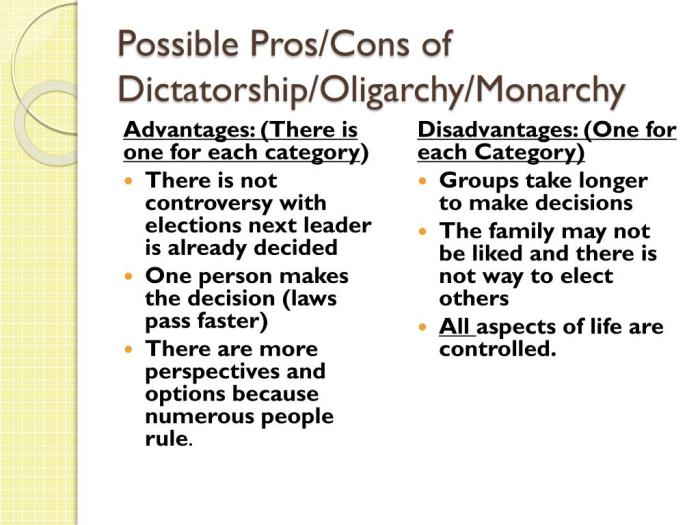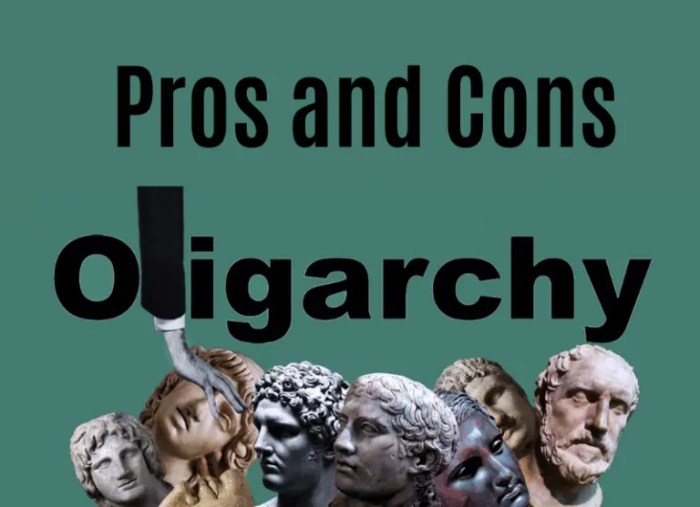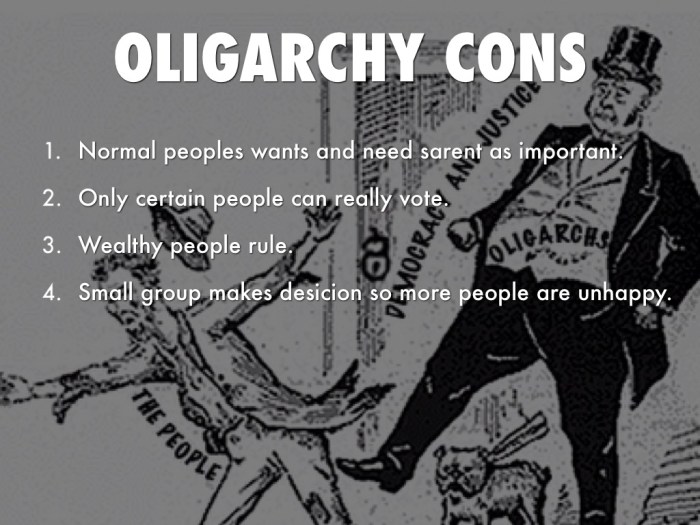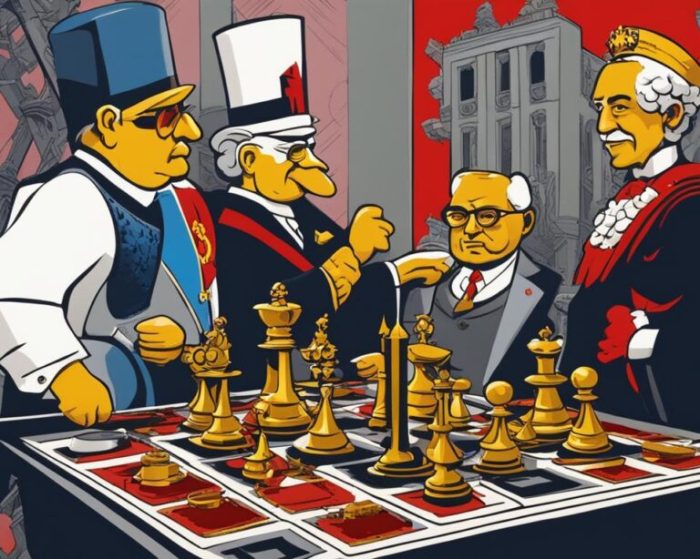The pros and cons of oligarchy form a complex and multifaceted topic that has intrigued scholars and political observers for centuries. This exploration will delve into the advantages and disadvantages of concentrating power in the hands of a select few, examining historical examples and modern manifestations of oligarchy.
From the efficient decision-making of ancient Athens to the economic inequality of modern plutocracies, oligarchy has left an undeniable mark on human societies. This analysis will shed light on the intricate dynamics of oligarchic rule, providing insights into its potential benefits and drawbacks.
Advantages of Oligarchy

Oligarchy, a form of government where power is concentrated in the hands of a few, offers certain advantages. One notable benefit is the potential for efficient decision-making. When power is vested in a small group, decisions can be made swiftly and without the need for extensive debate or consensus-building.
This streamlined process can be particularly advantageous in times of crisis or when quick action is required.
Stability and Continuity
Oligarchies often foster stability and continuity within a society. The limited pool of rulers provides a sense of consistency and predictability, reducing the likelihood of sudden or drastic changes in policy. This stability can create a favorable environment for economic growth and social development, as individuals and businesses can plan for the future with greater certainty.
Specialized Knowledge and Expertise
Another potential advantage of oligarchy is the concentration of specialized knowledge and expertise among the ruling elite. When power is held by a select group of individuals, they can leverage their specialized knowledge and skills to make informed decisions that benefit the society as a whole.
For example, an oligarchy composed of experts in economics, science, or military strategy may be better equipped to address complex challenges facing the nation.
Disadvantages of Oligarchy: Pros And Cons Of Oligarchy

Oligarchies, where power is concentrated in the hands of a small elite, can lead to various negative consequences. These include risks of power abuse and corruption, stifling of innovation and creativity, and potential economic inequality and social stratification.
Risks of Power Abuse and Corruption
When power is concentrated in the hands of a small group, there is an increased risk of power abuse and corruption. The elite may use their authority to benefit themselves and their associates, rather than the broader population. They may engage in unethical practices, such as bribery, nepotism, and cronyism, to maintain their power and wealth.
Stifling of Innovation and Creativity
Oligarchies can stifle innovation and creativity by suppressing dissenting voices. The elite may be resistant to new ideas and perspectives that challenge their established positions. They may control the media and education system to promote their own views and suppress opposing viewpoints.
This can create an environment where new ideas and challenges to the status quo are discouraged.
Oligarchy, where a small group of elites hold disproportionate power, offers both advantages and drawbacks. For instance, it can provide stability and efficient decision-making. On the other hand, it can lead to corruption and suppression of dissent. Understanding the nuances of oligarchy is crucial for assessing its merits.
In this regard, the insightful analysis provided in “Logico o Ilogico Leccion 7” ( logico o ilogico leccion 7 ) sheds light on the complexities of oligarchic systems and their impact on society. By examining the pros and cons of oligarchy, we can better evaluate its potential benefits and risks.
Economic Inequality and Social Stratification
Oligarchies can lead to economic inequality and social stratification. The elite may control key economic resources and industries, accumulating vast wealth while the majority of the population faces economic hardship. This can create a society with a wide gap between the rich and the poor, and limited opportunities for social mobility.
Historical Examples of Oligarchies

Oligarchies have existed throughout history, shaping the political and social landscapes of various societies. Two notable examples include the Venetian Republic and the Medici family in Florence.
The Venetian Republic
The Venetian Republic, a maritime empire that flourished from the 9th to the 18th centuries, was governed by a complex oligarchy. Power was concentrated in the hands of a small group of wealthy families, who formed the Great Council, the Republic’s supreme governing body.
The Council controlled all aspects of Venetian life, from foreign policy to trade and taxation.Factors contributing to the rise of the Venetian oligarchy included its unique geographical position, which fostered a thriving maritime trade economy, and its strong navy, which protected its commercial interests.
The oligarchy’s stability was maintained through a system of checks and balances, which prevented any one family from gaining too much power.The Venetian oligarchy had a significant impact on Venetian society. It promoted stability and economic prosperity, allowing Venice to become a major cultural and commercial center.
However, it also led to social inequality and political stagnation, as the oligarchy resisted reforms that could have broadened political participation.
The Medici Family in Florence, Pros and cons of oligarchy
The Medici family, a powerful banking and political dynasty, dominated Florence from the 15th to the 18th centuries. The family’s rise to power began with Cosimo de’ Medici, a wealthy merchant who used his wealth to gain political influence. His descendants, including Lorenzo the Magnificent, continued to expand the family’s power, becoming de facto rulers of Florence.The
Medici’s rise was facilitated by their control over Florence’s banking system, which gave them immense financial power. They also benefited from Florence’s thriving wool trade and its position as a center of Renaissance culture. The family’s patronage of the arts and sciences contributed to Florence’s reputation as a cultural hub.The
Medici oligarchy had a mixed impact on Florentine society. It fostered cultural and artistic flourishing, but it also led to political corruption and social unrest. The family’s grip on power eventually weakened due to external pressures and internal divisions, leading to their eventual downfall.
Modern Manifestations of Oligarchy

Oligarchy remains a prevalent force in contemporary society, albeit in more subtle and nuanced forms than its historical counterparts. Modern oligarchies manifest in various spheres, including politics, business, and media.
One striking feature of modern oligarchies is their decentralized nature. Unlike traditional oligarchies, where power was concentrated in a few prominent families or clans, modern oligarchies are often composed of loosely connected individuals or groups with shared interests. These individuals may not hold official positions of authority but wield significant influence through their wealth, connections, and access to information.
Oligarchy in Politics
In the political realm, oligarchic tendencies can manifest in various ways. Wealthy individuals or corporations may exert undue influence on policy decisions through campaign contributions, lobbying, and other forms of political spending. This can lead to policies that favor the interests of the wealthy elite at the expense of the broader population.
Oligarchy in Business
In the business world, oligarchies often arise when a small number of large corporations dominate a particular industry. These corporations may collude to set prices, stifle competition, and limit consumer choice. This concentration of economic power can lead to higher prices, reduced innovation, and diminished economic growth.
Oligarchy in Media
The media landscape has also become increasingly oligopolistic, with a handful of large corporations controlling a significant portion of the news and entertainment content consumed by the public. This concentration of ownership can limit the diversity of perspectives presented in the media and shape public opinion in ways that benefit the interests of the dominant corporations.
Implications of Oligarchy in the 21st Century
The rise of modern oligarchies raises concerns about the health of democratic institutions and the equitable distribution of power. Oligarchic tendencies can undermine public trust in government, lead to economic inequality, and stifle social mobility. It is essential to recognize and address these challenges to ensure that societies remain truly representative and responsive to the needs of all citizens.
Top FAQs
What are the key advantages of oligarchy?
Oligarchies can facilitate efficient decision-making, provide stability, and concentrate expertise in the hands of a select few.
How can oligarchies stifle innovation and creativity?
By suppressing dissenting voices and limiting the flow of new ideas, oligarchies can hinder progress and innovation.
What are some historical examples of oligarchies?
The Venetian Republic, the Medici family in Florence, and the East India Company are notable examples of historical oligarchies.
How do modern oligarchies differ from historical ones?
Modern oligarchies often operate in less formal and more diffuse ways, relying on economic and social influence rather than overt political power.
